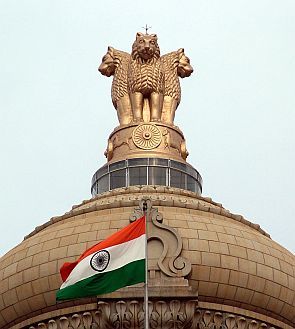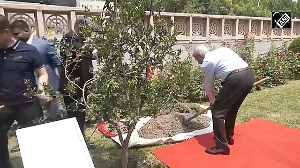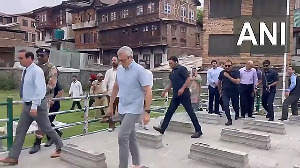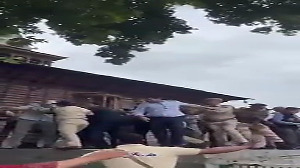
Ajit Doval, former chief of Intelligence Bureau and now head of the Vivekanada International Foundation, continues his furious argument against any kind of Central Bureau of Investigation action against his former colleague Rajinder Kumar in the Ishrat Jahan fake encounter case of 2004.
It is clear from Doval’s interview to Sheela Bhatt that while pursuing the national interest, the IB's work and its agenda blur what is legal and what is not. Rajendra Kumar's case has thrown up the issue of citizen's rights and the issue of justice, with the IB's official mandate that views it differently.
Doval talks here on issues of intelligence bodies, the "illegality" inherent in intelligence-gathering processes that, so far, nobody was ready to talk about although everybody understood it and even accepted it the way it is.
Part 1: Ishrat case: 'CBI versus IB has national security implications'
There is an impression that the Intelligence Bureau has grown too big.
That is a completely wrong impression.
How can you say that when there is such a strong lobby that is defending it? The governor of Andhra Pradesh, a former IB chief, has written to the prime minister. People like you who are in public life are out to defend it. The home ministry is defending it. You are all only talking about one single case and one single officer from the IB.
It is not a question of a single man, it is a question of principles. The principle is that the IB works in secrecy. They do not defend themselves in the court and in the media. They have no opportunity to say what the real truth is. There is no forum, there cannot be any forum -- intelligence agencies cannot work that way. They have to work in total secrecy. They have to maintain secrecy. They cannot be exposed like this to the whole nation.
I agree that secrecy is needed but under that excuse you can’t be a party to …
You must first understand this issue of secrecy. Intelligence is understood by people in three entirely different ways. There are three segments. The IB should not be at all protective. And the IB should be totally answerable as far as intelligence generation is concerned -- to Parliament, to the political executive, to the media, and to the people at large.
The second issue is about the intelligence structures. It is like another government department, they should be subject to all checks and balances and things like that -- transfers, posting, promotions etc.
The third aspect is about intelligence processes. Here it is entirely a matter of trust. Intelligence personnel are told you have no relief under the law, you will not transgress the law. You operate within the law, but you can keep your processes secret. So they maintain their secrecy and there is a relationship of trust that this code of conduct will not be broken. That is, you will not transgress the law. Should they do anything for personal benefit, etc, the punishment for them should be much higher.
But there will be a section of people who think the IB has transgressed the code, what then?
Then let there be evidence.
The evidence is there in the Ishrat Jahan encounter charge-sheet. The charge-sheet has been filed, sir, have you read it?
No, I have not.
Sir, do you know (the IB official implicated in the Ishrat case) Rajinder Kumar?
Obviously I do. Obviously, if I have worked in that organisation for 40 years, any IPS officer in such a capacity…
What kind of an officer is he?
No, that I can’t say, it’s confidential. There is no question of saying anything about him. He is a first-rate officer. He is a good man. He is a sincere, hard-working, simple man. A very God-fearing, highly patriotic and nationalist person. And I am not here to comment on his professional capacity and capabilities.
If the CBI now files a supplementary charge-sheet in the case making him a co-accused and arrests him, what will be the implication?
For whom?
For the IB?
I do not know the facts. The impression among the IB rank and file is that an innocent officer is being hounded. The common man in the IB feels that way. I do not know about the senior officers, probably they might also be thinking like that, otherwise the director of IB (Asif Iqbal) would not be writing to the PM and CM or whoever. The DIB is considered to be a man of great integrity and independence. If he tells the PM that this officer is honest, this officer has got no involvement in that case, he has got to be taken on his word. And if not, then let him come to the court of law.
Is it okay to do so?
It’s not okay. (By doing so) You will have destroyed an organisation. You will have reduced the country’s ability to fight terrorism, to fight espionage. One man’s troubles will finish the system. Everyone down the line will not do anything. They will do exactly what the law asks them to do, nothing more.
If you have surveillance on a person who is a terrorist, it is illegal. But according to the law, till he is convicted he is not a terrorist. If you try to plant a person in the Lashkar-e-Tayiba, it is illegal.
If you are trying to find out anything, in any way, by any process through which you collect intelligence which does not fall within the ambit of the law, the IB guy will not do it. He has got a good excuse. He will tell his senior, I cannot do it. Who can force him to do it?
Only his conscience, his patriotism, his nationalism motivate him.
An officer finds out that a terrorist has gone into, say, a madrasa or any religious place and it is namaaz time. He changes his dress, puts on a skull cap and starts offering namaaz. If somebody asks him his name he may say his name is Muhammad Umar. It is impersonation. And it’s wrong. He is misleading and giving wrong information. In case the questioner knows it, he can tell the police and have the IB guy arrested.
So why would he do that now? He will stop outside. He will say I don’t have to follow a suspected terrorist. But then inside, a 100 innocent people could die. You know that he is a terrorist and he might have gone to use his weapons. But the IB guy can say that I will do strictly what is within the law.
The point is, there is no one, the DIB, the PM or anyone who can force him to do anything which is outside the purview of strict legality. He does it at his personal cost. He has got no immunity. He knows if he is caught he will be shot.
If a person goes abroad under diplomatic cover, it is illegal. Then the police can arrest him for impersonation. If the person has gone abroad with a wrong name, even got a passport under a false name, all this on duty -- and if he is arrested, what then?
What nonsense are we talking about? Is this the kind of media we have? They don’t understand anything about statecraft or intelligence-gathering techniques. Just because they can understand English they think the world starts and stops with them.
Have you understood how nations have been degraded and finished? How nations are built, and what is this thing called statecraft? So, we have to see it in the larger orbit, from a bigger perspective. ‘Sileas populi suprema’ -- that the interest of the people is supreme.
The CBI has filed the first charge-sheet in the Ishrat Jahan case. If the CBI does not fully account for Rajinder Kumar’s role, then the entire legal case will become weak and nothing will come out of the investigation. In the interim, all this lobbying has happened and the case has turned political. Then there is your logic too to be considered. This may put the CBI in a fix. It is a very dicey situation, isn’t it?
I can understand that. But let me tell you one thing…
The supplementary charge-sheet is necessary to sustain the case.
Woh toh unki problem hai (It’s their problem). Will you continue to multiply your mistakes? That does not happen. Let me tell you one thing. The CBI has got no additional power. The CBI has got the same power as a normal sub-inspector of police in 12,000 police stations across the country. Any policeman can register a case against an IB officer, from the DIB downwards.
And if somebody comes to know that two persons have crossed the border from one of the intelligence agencies, it can be the army, RAW, IB etc, to find out what is happening, whether there is any terrorist coming, or any military movement happening, he can go to the police station and register a case for illegal infiltration by an Indian officer into a foreign country and expose those persons who have gone. Who will stop that, now?
Is it not illegal?
It is. It is an offence if anyone crosses the border, whether it is a smuggler or an intelligence agent. Is there any country in the world which is run like India? An American, Davis Raymond, was arrested for killing two people in Lahore, he was arrested by the Pakistan police, and to rescue him the US government killed two more people and after that they took him out of jail. That is the way a country works, and they have no regrets about it. This is what a nation has to do.
What is the best way out of the current tussle between the CBI and IB?
That is for the government to decide. I think the best way out is that they should have an objective and fresh investigation into the case -- and a proper investigation. The government can always start a re-investigation.
But nine years have passed...
You cannot destroy the nation just because someone has been indiscreet. Otherwise the consequences will follow in many ways. The IB people will then draw their salary and sit idle. They will stop short wherever something is not fully within the law. For example, nobody can question a terrorist or a spy other than the IB man. What will the policeman know? He does not know where Lahore or Kabul is, and he does not know who formed the Al Qaeda, etc.
If you don’t allow the IB to do its duty then a semi-literate head constable will be judging a foreign spy who has been in Orissa near the Chandipur missile site….
Does the Ishrat Jahan case and the controversy suggest that we should go strictly according to the rule book?
Better governance. That is, you control and command the system. And you say this much and no further. And when it is found that people have deliberately done this thing, the DIB and the director of CBI should sit across the table and talk about all the facts. The DIB should know when this was done, what was the instruction, what was the information etc. And in case they both are convinced that this man was wrong then they should jointly decide on the action because it is in the interest of the DIB to see that there is no one indulging in illegal activity.
The IB is extremely fussy and fastidious about anybody going even a millimetre out of line. You do not know the IB’s internal systems or control and command, which are tremendously harsh. It is like in the army.
If it is found that Rajinder Kumar was present at the scene of the crime, what then?
No person in the IB would have protected a wrong man. They don’t do that. They know that this is something which is suicidal for them. If people start misusing the trust placed in them, where will the buck stop? It is not like any other organisation or any other department or ministry where you can get away with it. You are answerable and accountable.
You haven’t read the charge-sheet, but you still blindly believe that the allegations against Rajinder Kumar are incorrect?
Because the DIB has looked into it and has told the government that they have looked into it…
The DIB has not said the CBI’s allegations are untrue. The DIB is against the arrest of Rajinder Kumar, possibly. There is a difference between the two.
I don’t think so. As far as my knowledge goes, the IB is strongly defending an innocent person who has been victimised. As I understand… everyone is convinced of the innocence of the officer. We have taken action against IB officers in the past, not in this matter, but in some other case, nobody ever raised a question. In the case of Ravindar Singh of RAW, no one objected when the case was registered, why or when his property was attached …every action was taken against him. Nobody came to his defence.
There have been cases like that.
I am not interested in the individual cases. I am also not interested in Rajinder Kumar. I am interested in the safety and security of this country and the impact it will have on its functioning. You will start seeing the repercussions as time goes on.
I think the country has to make some basic decisions. Do we need an intelligence apparatus? Should that intelligence apparatus work in the open and be on the streets, and should everything they do be known to everyone, including their adversaries and hostile agencies? Shall we say this is the work we are doing, the technology we are using…?
Why should it be this way?
If the media wants to know everything, let the media decide. Will the media take responsibility for anything that goes wrong? (Former British prime minister) Margaret Thatcher rightly said that the media sustains terrorists. Understand the implications of statecraft.
See the American media, they are no less free. The first speech after September 11 that President George W Bush gave, that America values the freedom of its people, the values of democracy and the supreme sovereign rights of the country. Why should there be a clash between the two?
Read President Barack Obama’s speech where he says on the line that yes, we have indulged in illegalities. He says it had to be done for the supreme sovereign democracy. Everybody understands that. We had to put people into Guantanamo Bay because we had to illegally detain those people. Obama also said that which implied that he had to kill under the law. All of them supported Obama. He was elected again.











